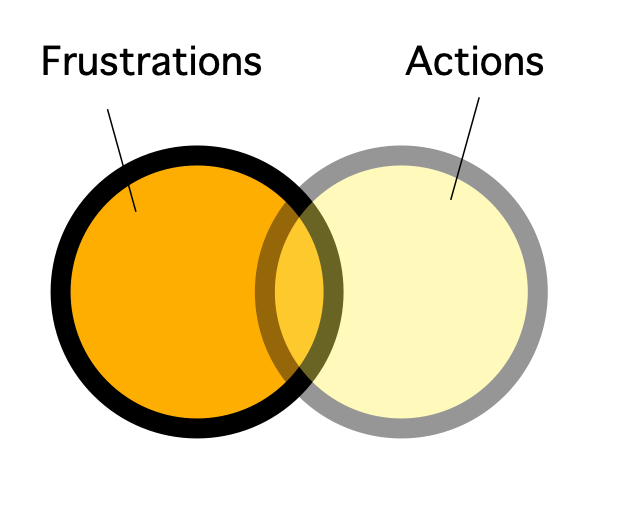Design leadership is broken? (response to Reddit)
My answers to challenging opinions from Reddit
I came across this fascinating, and frustration filled, thread on Reddit about the failures of design leadership. And in particular, design events. I wrote the book Why Design Is Hard specifically to address these issues.
I’ve pulled interesting comments here so I can respond to them in one place. Hopefully this doesn’t break Reddit ettiquite I’m not aware of.
Leaders are out of touch / things are broken
DesignGang wrote:
I don't think they truly understand how difficult it can be for the average designer who works at a company that doesn't see the value in design, or completely misunderstands it.
I feel like we've been talking about a seat at the table for, what, ten years now? Something is fundamentally wrong, and those in power don't want to change the status quo.
The book opens by explaining reasons designers feel disapointed:
Having your ideas ignored and misunderstood
Being involved late in important decisions
Feeling undervalued in your organization
Needing to explain or justify your role
Feeling defeated that nothing ever changes
And the first lesson of the book is that these problems are not your fault. You entered this career expecting something better, but have been let down. That sucks.
The 10 situations we should be training for
IniNew wrote:
This has always been one of my biggest complaints about the industry. We champion user empathy, and understanding of pain points and struggles... and then when a designer talks about not having influence, we finger-wag at them and tell them they're not working hard enough or aren't good enough, completely ignoring any sort of outside constraints or factors.
And they are right. Designers are often set up to fail.
In the book there are ten critical situations designers face. We need to all be trained to overcome them. It should be something all designers are taught early on. I thought this book was necesary because this is not taken on directly anywhere else I could find (these came close). We will always face them at some point in our careers since there are so few of us in the world.
The book and this substack gives practical advice on all them:
No one knows what you do or what value you add
You’re told there isn’t time
Decisions are made without you
You’re struggling to find good ideas
No one listens to your suggestions
People challenge you on basic UX knowledge
They think they can replace you with a tool
You got a seat at the table, but the table is filled with fools
The resources you were promised disappear
Confidence in these situations is as important in a successful design career than talents or skills. Why? Without the ability to handle these situations, your talents will often be ignored. That’s tough to hear, but the logic is sound (e.g. more design talent won’t help you if you are always ignored).
Design Conferences are Delusional
The original poster Superbureau focused on their experience at Product Design Week in the UK. MudVisual1054 added:
Those conferences of just designers is just a giant circle jerk of those portraying that we live in a world of sunshine and rainbows. No hard conversations at all. I think that’s due to the extreme optimism people that the industry pulls in. I know the designers who do have a backbone leave and go into Product Management because they know it won’t change.
In the book I’m critical of design conferences in how they often perpetuate the ego trap (the belief that designers are, or should be, the center of the universe).
However I realize that conferences are a business and a difficult one. Go ask any organizer, even of a “bad event”, why they do it. They are trying to help, it’s just harder than it seems. Finding good speakers is hard (they are the most in demand). Giving a good, useful talk is hard as a speaker. And it’s scary to be honest and say unpopular things. Before the pandemic events were a tough business and it’s harder now.
This doesn’t excuse low quality events, but if they are filling seats there is a reason: people are more likely to pay for sunshine and rainbows. They may prefer escapism to hard truths. Tough truth events I’ve loved like Failcon rarely last.
As far as moving to product management I advocate taking jobs that get to make the decisions you want to make. That’s it. If that’s called design, or product management, or Senior WidgetFlipper, who cares? If you actually are empowered to do the work you want to do, and paid well for it, that’s the job you should consider.
Sucking up to the C-Suite
Negneal wrote:
The “follow you passion” speeches of 2008 have turned into “make friends with c suite” and it only works that way for less than 1% of the lucky ones. Most are held down and back because value is attributed to Product or Engineering. They simple will always have more bodies than UX.
There is a good argument here that designers rarely have much power.
However the framing here is a dead end. OK: it sucks and it’s unfair. Yes, you will be outnumberd. I can validate all of these facts. So now what? That’s really the question. NOW WHAT? These complaints are older than I am.
Other than the value of venting, which can be healhty, the problem is the belief that complaining changes anything on its own. Some problems are wickedly hard, despite how painful they are and how long they have been around. To be the most senior designer in a business is a tough, isolating job: it’s not always the VP of design’s fault there are big problems.
In the book I use the model of gravity problems, from the book Designing Your Life, by Burnett and Evans to help. They explain:
The key is not to get stuck on something that you have effectively no chance of succeeding at. We are all for aggressive and world-changing goals. Please do fight City Hall. Oppose injustice. Work for women’s rights. Pursue food justice. End homelessness. Combat global warming. But do it smart. If you become open-minded enough to accept reality, you’ll be freed to reframe an actionable problem and design a way to participate in the world on things that matter to you and might even work.
It’s healthier, and more likely to change things, to focus on where you can take actions on your frustrations. Even if it’s a small set of things. To continually focus on things you do not (yet) have the power to change is self-destructive. It tends to make people bitter and focused on themselves and their disapointments. If your organization is truly a dead-end, which it might be, then your challenge is acceptance.
Curiosity is a superpower for designers
JobAffectionate4078 wrote:
If you want some reality, start calling and meeting your design friends for coffee or lunch. Tell them what you’ve been experiencing lately… then ask them what they think is going on, how it’s effecting them, what’s causing it, etc. People aren’t going to stand on a stage and outline their fears and instincts about the industry and where it’s headed, but they will tell you a whole lot face to face!
I love the spirt of this. Having peers you trust to discuss the hard things with is important.
The risk is this can be an echo chamber and a support group, rather than a path to becoming fulfilled enough that your need for a support group declines.
Design events themselves suffer from this as there are rarely CEOs, PMs or engineers in the room or on stage to offer good counterarguments to flawed assumptions about what the problems are. It’s natural that design events, and communities, suffer from preaching to the choir.
In Why Design Is Hard I advocate using the designer superpower of curisoity. Be curious about whoever or whatever frustrates you most at work. Most frustrations for us are optimizations for someone else. Think about that. The system is designed, it’s just not currently designed for you in mind. And if you read Erika Hall, your salary likely comes from the fact the organization doesn’t center on you.
Do user research on the people you wish trusted you more. What are their real needs? What problem are they really trying to solve? Get curious and investigate. If you focus on blame there is almost no chance of making a discovery that helps you. But if you focus on curiosity there is some chance you’ll see a way to make your situation better.
In summary: but it’s more work!
Of course all of this sounds like work, and who wants more work to do? I’m empathetic. I don’t think anyone is obligated to do it.
However, to improve your situation is going to cost you something, even if it’s just setting more realistic expectations for yourself, your workplace and your career.






One of the organizers of this event published a response to the Reddit thread:
https://www.linkedin.com/posts/lukeiconic_time-for-some-real-talk-designers-mainly-activity-7263866889569767425-mREw?utm_source=share&utm_medium=member_desktop
Well Scott, your next book can be something like confronting things in a digital post-truth world. I think a lot of people would like some tools. I despise people who (I'm making this up) say, "It must be true or they wouldn't have forwarded it."